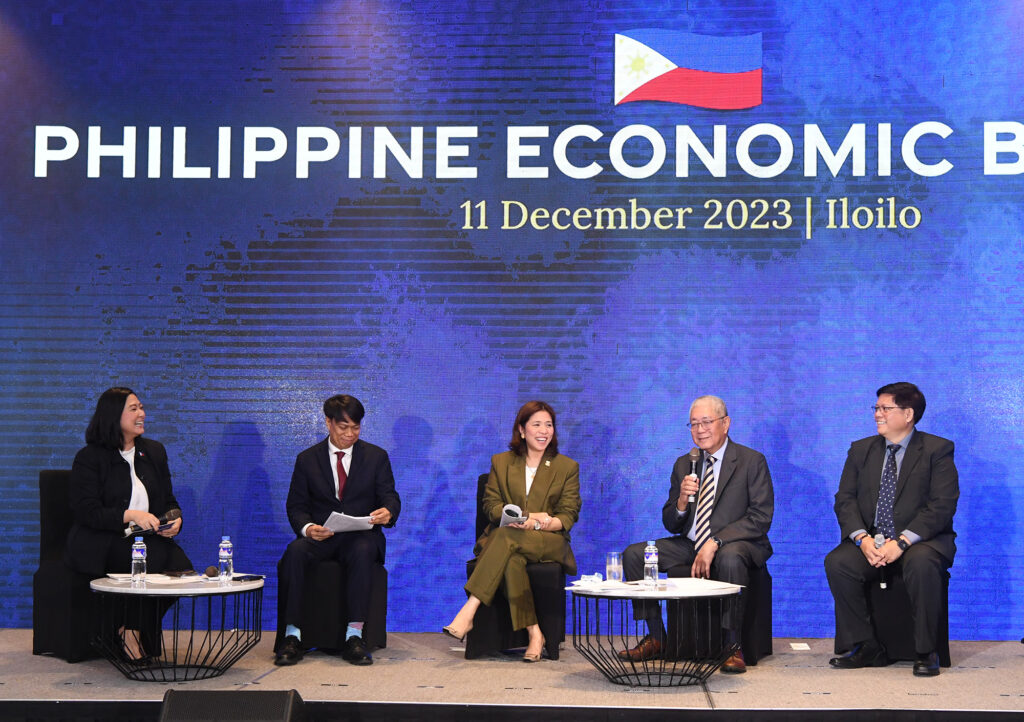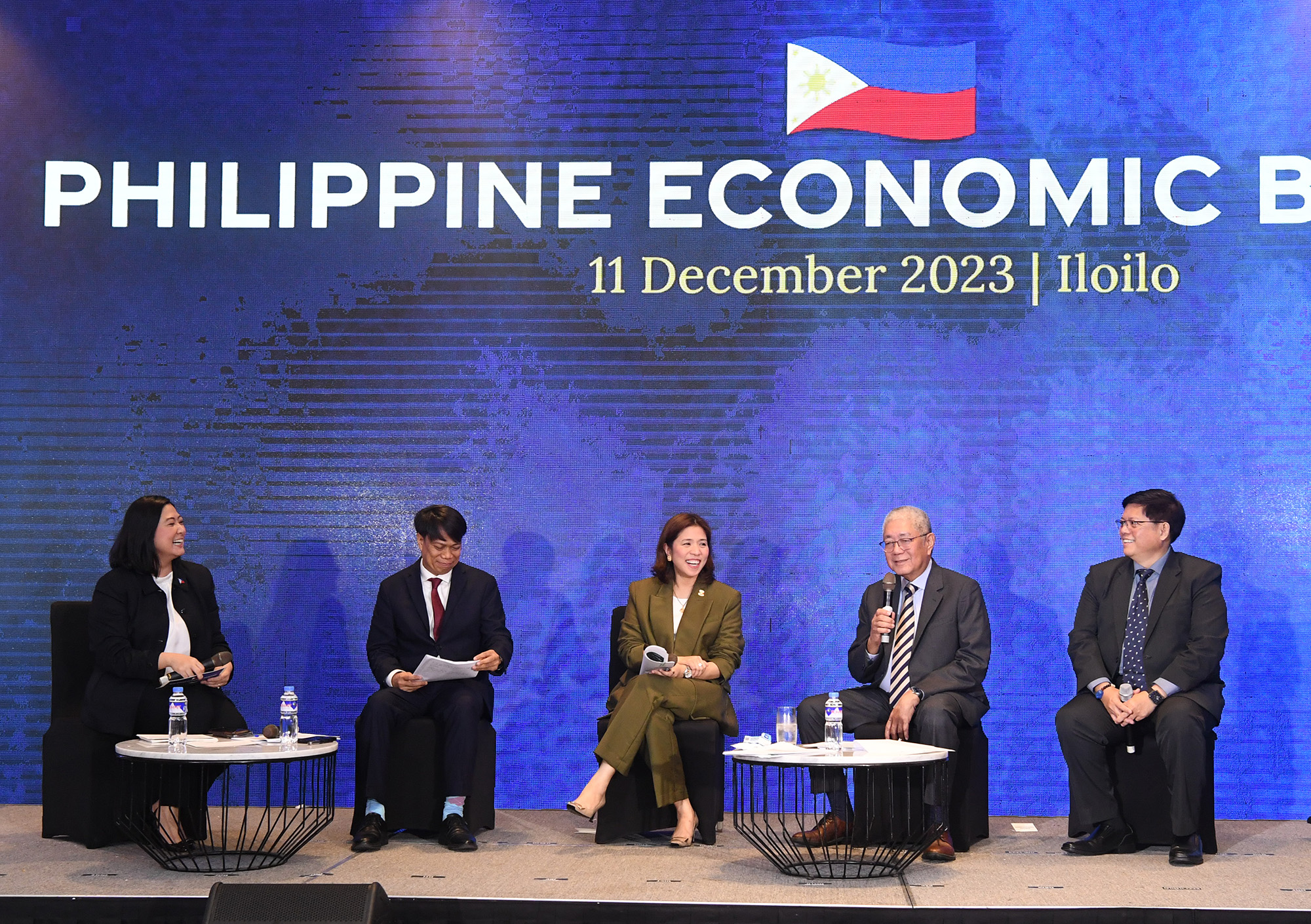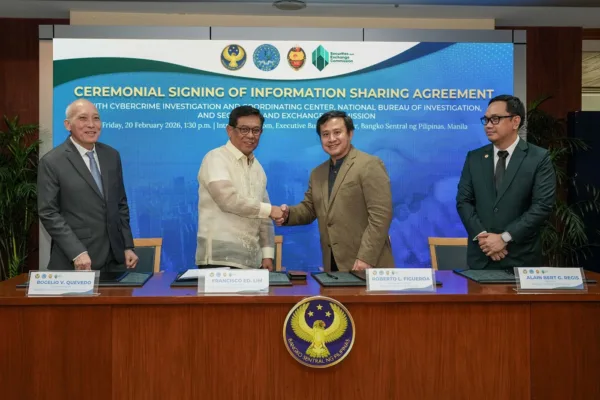Bangko Sentral ng Pilipinas (BSP) Governor Eli M. Remolona, Jr. said the central bank’s strategy to support sustained economic growth is focused on three key challenges: managing monetary policy in a supply-shock economy; digitalizing the banking system; and maintaining a safe and efficient payments system that serves the unbanked.
At the Philippine Economic Briefing (PEB) held last December 11 in Iloilo City, he said that inflation is central to the conduct of monetary policy.

BSP Governor Eli M. Remolona, Jr. together with other economic leaders at the PEB in Iloilo City
In a supply-shock economy, monetary policy is about anchoring inflation expectations to move toward the government’s target range of 2.0 to 4.0 per cent.
Domestic inflation has remained above the BSP’s target due to a series of compounding supply shocks brought by pandemic-related containment measures, geopolitical conflicts, and weather disturbances.
“Given that these supply shocks were already feeding into inflation expectations, the BSP pivoted and shifted to a more hawkish forward guidance on monetary policy. This timely pivot helped keep expectations fairly anchored around the target,” the BSP governor said.
He noted that headline inflation slowed down to 4.1 per cent last month from a peak of 8.7 per cent in January this year. This is due to improving domestic food supply conditions and lower global oil prices. Headline inflation is driven more by supply-side factors, over which the central bank has less control.
Core inflation, which excludes volatile prices of food and energy, slowed down to 4.7 per cent, reflecting the impact of monetary policy. Monetary policy has better influence over core inflation.
BSP-issued policies
To digitalize the banking system, the BSP has issued policies on digital banking, open finance, regulatory sandbox, and generative AI.
In terms of digital banking, the BSP has created a digital banking framework and has since licensed six digital banks intending to broaden the reach of services that traditional banks cannot reach. The BSP’s Open Finance Framework, on the other hand, aims to build an ecosystem of consumers and businesses with data and security at the center.
The BSP has also implemented a Regulatory Sandbox Framework that provides an avenue to explore the potential of game-changing technologies toward an inclusive digital financial ecosystem that supports growth and development as well as bridges financial inclusion gaps in the Philippines.
At present, the BSP is exploring generative AI and its many use cases while acknowledging cyber risks and the ethical use of technology.
“We want to make sure that this digitalization will result in better and more products that respond to the needs of clients, help them manage their finances, and enable them to seize economic opportunities,” the BSP chief further said.
In addition, the BSP also rolled out a Cybersecurity Roadmap and a robust fraud management system to address potential risks from innovation.
On the other hand, the payments and settlements system offers a gateway to financial inclusion to serve the unbanked. “The BSP’s efforts in payments are also looking beyond the Philippines toward regional and global opportunities,” Gov. Remolona explained.
Aligned with this, the BSP is working with ASEAN neighbors on interoperating our retail payments systems through Project Nexxus, for example, our Instapay, Thailand’s PromptPay, and Singapore’s PayNow. This provides a promise of making real-time retail payments interoperable in the region.
“The end view is to have scalable, truly global cross-border retail payments. This will not only help in remittances but also open broader economic opportunities for the country,” he added.
During the event, the BSP governor also participated in the panel discussion moderated by Department of Budget and Management (DBM) Undersecretary Margaux Marie V. Salcedo entitled, “A Fast-Growing and Forward-Looking Economy” together with DBM Secretary Amenah Pangandaman, Department of Finance (DOF) Chief Economic Counselor Zeno Ronald R. Abenoja, and Philippine Chamber of Commerce and Industry – Western Visayas Regional Governor Jobert A. Peñaflorida.








